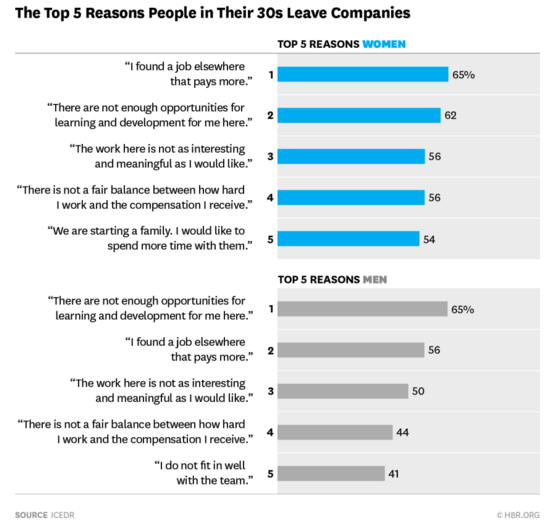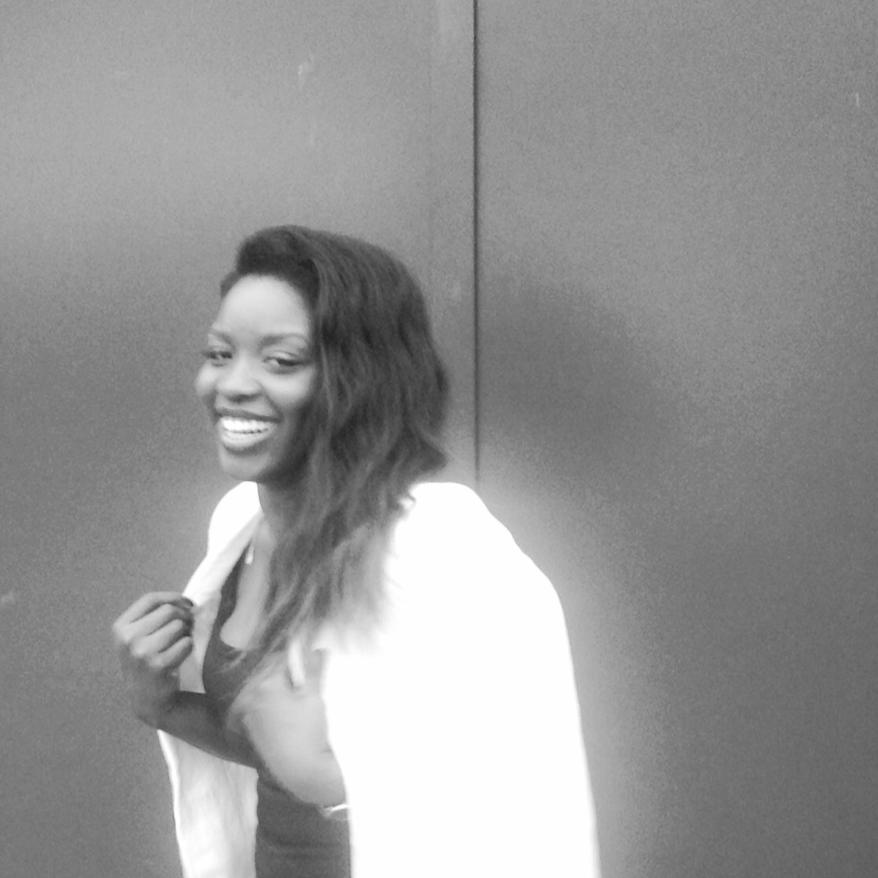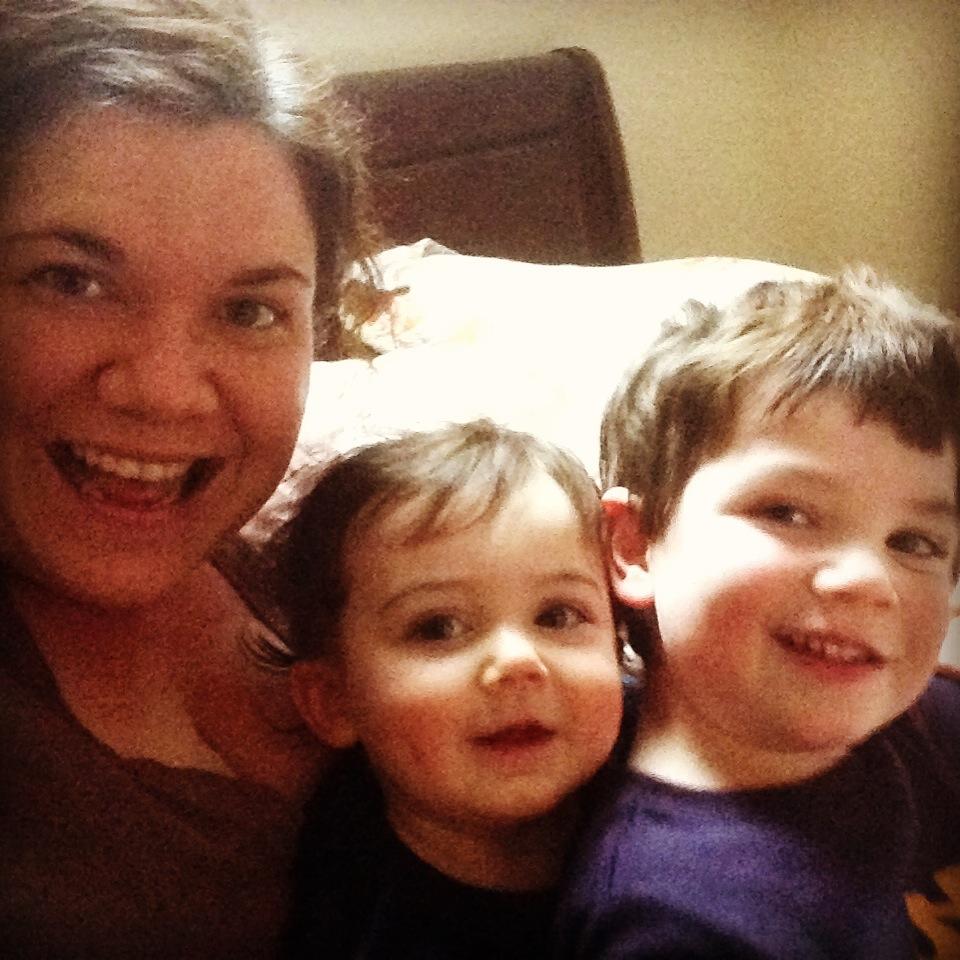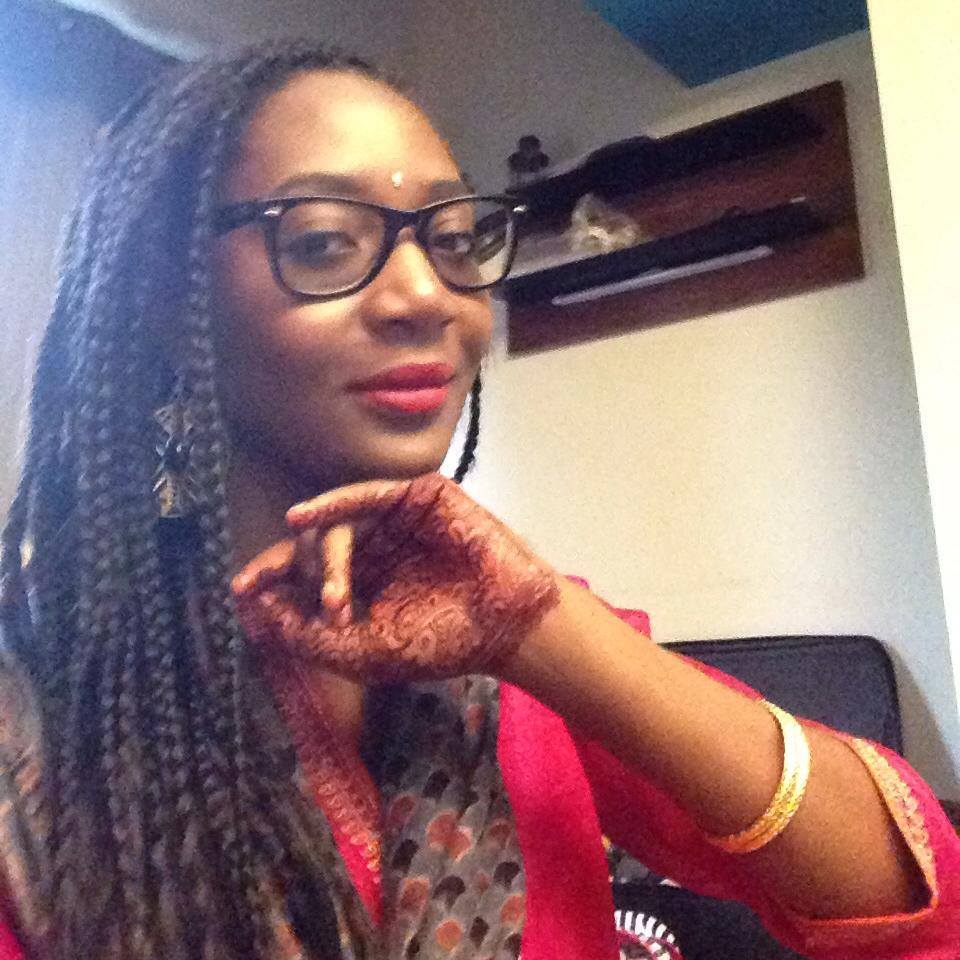Reasons Millennial Women Quit Work

By:
Women around the age of 30 aren't all leaving their jobs to have babies. Not only that, they're mostly leaving for the same reasons as men of the same age: They want you to show them the money.
A survey by the International Consortium for Executive Research showed that the top reason young successful women in their 30s leave their jobs is salary.
This doesn't mean that women aren't leaving jobs to raise families, but the survey found that there were four other reasons ranked higher than kiddos:
- "I found a job elsewhere that pays more."
- "There are not enough opportunities for learning and development for me here."
- "The work here is not as interesting and meaningful as I would like."
- "There is not a fair balance between how hard I work and the compensation I receive."
You can see how this compares to men's responses in this chart by Harvard Business Review.
 Harvard Business Review/ Source: ICEDR - hbr.org
Harvard Business Review/ Source: ICEDR - hbr.org
Although the ranking is slightly different, the top four reasons men and women in their 30s quit their jobs are the same. The one difference? Reason number five. Men listed "not fitting in" with their team and women listed "starting a family" as their fifth reason for leaving a job.
Although the reasons for leaving can be similar for men and women, the work environment often looks different for women. Christine Hunter Arscott, one of the authors of the ICEDR study, told ATTN: via email that women still report that work can be a "boy's club."
.jpg?auto=format&crop=faces&fit=crop&q=60&w=736&ixlib=js-1.1.0) Christie Hunter Arscott
Christie Hunter Arscott
"Even in the start-up space, which is often viewed as more progressive, I've interviewed women who speak of a 'fraternity' culture within their organizations," she said. "Most of these cultures aren't developed purposefully. They are often the result of inherent or unconscious bias that is intertwined and embedded into enterprise policies, programs, processes and cultural norms."
Arscott said that the "glass ceiling" is not the one obstacle women slam into and then quit their jobs. It's a ceiling women hit after enduring a marathon of issues that tires them out.
"Women do not progress with ease from early career to senior levels and then suddenly hit a glass ceiling. Instead they have to navigate through a labyrinth or maze of twists, turns, obstacles and set backs from day one," she said. "When women leave, it is most often not due to one event or factor but rather due to compounding factors faced overtime."
Everyone woman has a different work experience. Women in their late 20s and 30s told ATTN: what they personally look for in a good job and the struggles that would make them leave.
Ursula Lauriston is a 29-year-old living in Washington, D.C. She's the editor-in-chief of Capitol Standard, a magazine tailored to the interests of Washington's "young and powerful."
 Facebook/Ursula Lauriston - facebook.com
Facebook/Ursula Lauriston - facebook.com
Lauriston said that flexibility and a great work team are key qualities in a job.
"I need flexible hours because I'm not a robot and in order to be creative I need to be able to work outside of the office or at off hours. Next is working with incredibly smart people, and finally making more than my student loan bill is always awesome."
She's a big fan of short commutes and great D.C. neighborhoods. She's left a job because it was too far from where she lived.
"I have quit a career job and it was because the commute was unmanageable. I had no life because up to 4 hours of my day was spent on a train or bus. Yes, if the job was worth it I would have relocated, but honestly I had started to build a life in the neighborhood I lived in and that was more important than any job."
Lauriston stressed that jobs that allow women to balance their work and personal lives will keep women as employees.
"Millennial women are burning out of their jobs at an incredibly fast pace. If we don't have work life balance or some level of challenging work, it is very easy to reach 'the point of no return.' That's the point where you're so completely numb at work that your performance declines significantly."
Rae Daniel is a 26-year-old TV reporter near Missouri, Illinois.
 Facebook/Rae Daniel - facebook.com
Facebook/Rae Daniel - facebook.com
Daniel said that a great work team and upward movement are important qualities in a job. "I really need an opportunity to grow throughout my time there, position and salary wise, and healthcare benefits honestly," she said. "The environment, people I work with is a big factor for me."
Maureen Boston, 35, is an attorney in Maine.  Facebook/Mo Boston - facebook.com
Facebook/Mo Boston - facebook.com
Boston said that she loves her current job because she works with "kind, smart, and dedicated people" and her work has meaning. "As a lawyer, I wanted to help and not hinder equal access to justice," she said.
As the mother of two young boys under five, her flexible schedule of four days in the office is important as well. "For me, four days strikes the right balance of having a little extra time with my children and still being at work enough to be involved and handle a good sized caseload,"she said.
Boston also said that although money is important, respect as a female co-worker is something Millennial women should demand.
"It has been great to hear lots of talk of equal pay for men and women lately. But, I think Millennial women should take it upon themselves to make the conversation about more than money. I am a union member so I know I get paid equal to my male counterparts but, it doesn't make it any easier when I get treated differently than male attorneys. The moment will be forever etched in my mind when an opposing attorney told me I'd make 'a really great secretary if the lawyer thing doesn't work out.' I recently read an article about the CEO of Pepsi relating how people still call her 'honey' and 'sweetheart.' All these men commented that they didn't believe that would happen today to a woman in a professional context. It happens all the time. Women deserve money and respect, even if they are asking for maternity leave, or alternative schedules, or breaks to pump breast milk. I've been lucky to work for an accommodating employer, but I know many people who are not."
Sheri Bradford is a 29-year-old in Los Angeles. She works in the entertainment industry.
 Facebook/ Sheri Bradford-Demore - facebook.com
Facebook/ Sheri Bradford-Demore - facebook.com
Bradford said that the most important qualities in a job are growth opportunities, health insurance, and a stable work environment. "No yelling and no throwing," she said.
Bradford said that she's left a job in the past because it was stagnant.
"I've quit a career job because of no upward mobility possibilities," she said. "This was when I worked at the talent agency, and shitty pay plus work volatility and general dissatisfaction was not the business. The health insurance was superb though, like excellent."
Millennial women are trying different approaches to success and work-life balance can be hard to find, said Bradford.
"I feel like Millennials are divided into two camps. Those that expect everything to be given to them just cause, and those that believe that working hard seven days a week 24 hours a day will get them everything they want. I've been of both minds and neither has proven themselves as better than the other. I think there's this general sense that none of us have any idea what the hell were doing, but I'm not sure that's just a millennial thing."
Arscott said that one of the best ways for employers to keep women happy is to, well, ask them what they need to be happy.
"What obstacles are they facing? What challenges are setting them back or stagnating their growth? Do they feel treated fairly in comparison to male counterparts?" are all good questions, she said. "And then using this input to develop workplace strategies and programs informed by their own people."
